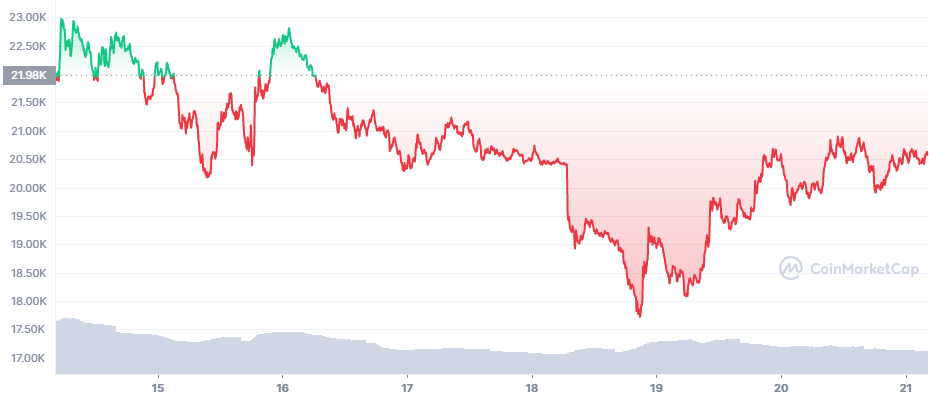Crypto Liquidations: Whales Bring Outsized Risk to DeFi

The biggest liquidations in the past week affected the Celsius protocol. But smaller hubs also saw their positions threatened by rapidly shifting prices and loans requiring more collateral.
One of the notable examples was a big client on Solent, a Solana-based lending protocol. Solent formed a DAO within hours when the loan was under threat. The goal was to liquidate the loan over an OTC trade, to avoid tanking the SOL price on the open market. The voting passed based on large-scale whale wallets, leaving smaller holders with no real decision power.
The effect was that the funds in the big whale wallet were seized to prevent a chaotic liquidation. The actual owner of the wallet is unknown, and there are some suggestions those whales in DeFi protocols may be the founders’ funds.
Recent evidence also showed a similar pattern on Vivres Finance, which is based on the WAVES platform. This time, on-chain data also suggested the biggest client of the protocol was an insider.
Events like that raise questions on the actual voting power within a DAO, especially based on token staking. The potential for large-scale influence and passing decisions on behalf of more powerful holders means DeFi projects hold hidden risks of non-transparent governance.
Did Solend Make the Right Call
One of the hypotheses was that the whale was weighing down the Solend protocol with oversized loans. The owner of the wallet also ignored margin calls and faced a large-scale liquidation. This would add to the market chaos and possibly pull down SOL prices.
For some, abusing a lending protocol may also be a deliberate attack. At this point, the whale remains anonymous, but the goal of Solend DAO was to prevent wider market contagion.
The unbalanced lending protocol was noted last weekend, while the market remained chaotic and Bitcoin (BTC) dipped below $20,000.
After the avoidance of automated liquidation, SOL rose to $35.00, adding more than 8% overnight and 26.25% in the past week.
In the end, the large loan is still outstanding and threatens Solana if the price dips under the liquidation level of $22.30. But the actions of the DAO show that decision-making may be swayed and not enforced immediately.
The actions of Solend DAO may have implications for other protocols, which are now experiencing the need for more protective mechanisms. There are also expectations the current bear market cycle may run longer and protocols may remain vulnerable. During a bear market, taking out a loan in stablecoins and leaving the collateral to be liquidated may be a choice for many “whales” with no other tools of cashing out.
Solana is especially vulnerable as its validator nodes may once again break their consensus in case of panic and transaction overload. But other protocols may be exploited in a similar way.
The total value locked on Solana is down to just $2.5B for all DeFi projects. During peak times, collaterals were valued above $14B in notional value. Solend holds $266M in value and is among the top lending protocols. Solend dominance is aboev 10% and raises the danger of concerted attacks, as in the case of Anchor protocol. The crash of Terra LFG was precipitated because of unbalances on Anchor, which led to liquidations and de-pegging the UST stablecoin.
Will BTC Drag Markets Down Lower
BTC recovered above $20,500 on rumored interventions from big whales. The asset remains risky for rapid price movements to liquidate both long and short positions.
Predictions see BTC returning under $20,000 once again, probably breaking as low as $16,000. Those are some of the most bearish predictions, while BTC shows it can drop quickly under the $20K mark.
The Crypto Fear and Greed Index remains at nine points or extreme fear, slightly up from its record low of 6 points. BTC is still within the range of the Rainbow Chart and has not completely abandoned longer-term bullish predictions. Additionally, spot BTC buying continues, building up small retail wallets.
One of the big problems is BTC is still used as collateral for DeFi. Wrapped BTC still has a supply of 266,880 coins locked in various DeFi protocols.
Tether Burns More Tokens
More USDT is leaving the market after a rapid burn. USDT stabilized its supply around 72B tokens for more than a week, but another burn keeps eating into that supply.
As of June 20, USDT only had 67.92B tokens outstanding and still hovered at $0.99. In one transaction, 6.6B tokens were burned in one transaction, based on blockchain data.
A diminishing supply of USDT will have repercussions across the board, both for exchanges and for DeFi. USDT trading volume was still above $52B in 24 hours. The stablecoin is used in trading pairs and in arbitrage on decentralized trading platforms.

With over 50 coins and an obsession with security, Kraken is one of the safest places to buy and trade crypto.

Kraken has a good reputation for security and protection of your funds and operates across the USA (except NY), Canada, the EU and Japan

Learn how to keep your crypto secure and the different types of wallets you can use.

Eight ways to buy Bitcoin without needing ID or giving personal information

The first cryptocurrency. It has limitations for transactions but it is still the most popular being secure, trusted and independent from banks and governments.

The leader in programmable money, smart contracts and decentralised applications. There have been many copycats but none have the community and level of adoption.